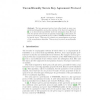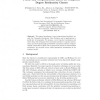5 search results - page 1 / 1 » Multisignatures secure under the discrete logarithm assumpti... |
CCS
2008
ACM
13 years 6 months ago
2008
ACM
Multisignatures allow n signers to produce a short joint signature on a single message. Multisignatures were achieved in the plain model with a non-interactive protocol in groups ...
CCS
2006
ACM
13 years 8 months ago
2006
ACM
A multi-signature scheme enables a group of signers to produce a compact, joint signature on a common document, and has many potential uses. However, existing schemes impose key s...
CN
2006
13 years 4 months ago
2006
In certain reliable group-oriented and multicast applications, a source needs to securely verify whether all (and if not all, which) intended receivers have received a message. How...
IMA
2001
Springer
13 years 9 months ago
2001
Springer
Abstract. The key agreement protocol are either based on some computational infeasability, such as the calculus of the discrete logarithm in [1], or on theoretical impossibility un...
EUROCRYPT
1999
Springer
13 years 9 months ago
1999
Springer
Abstract. This paper investigates a novel computational problem, namely the Composite Residuosity Class Problem, and its applications to public-key cryptography. We propose a new t...


